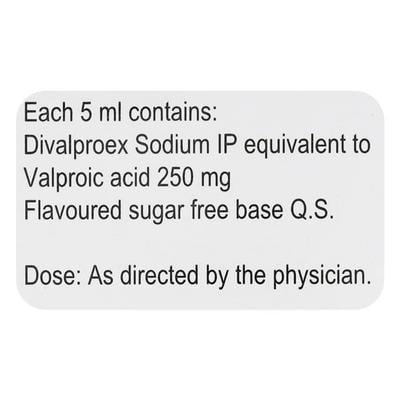

Netmeds First Membership
Quick Links
Introduction About DIVAA 250MG ORAL SOLUTION
DIVAA 250MG ORAL SOLUTION is used for monotherapy and adjunctive therapy to manage patients with complex partial seizures that occur either in isolation or in association with types of seizures. It is also used to manage manic episodes associated with bipolar disorder, complex partial seizures, with or without other seizure types in adults and children (above 10 years of age) and migraine headaches. It contains Divalproex which belongs to the group of medicines called Anti-epileptic agents.
Your doctor may advice you to take several blood tests to understand your existing condition. Avoid consumption of alcohol while taking this medicine, as it may make you feel drowsy. DIVAA 250MG ORAL SOLUTION is not recommended for use in patients with liver disease or significant liver dysfunction and urea cycle disorders. Before taking, inform your physician if you have kidney problems, systemic lupus erythematosus and porphyria. It should be used with caution during pregnancy. DIVAA 250MG ORAL SOLUTION is not recommended for use by breastfeeding women.
The most common side effects are nausea, vomiting, dizziness, double vision, weight gain, problems with walking or coordination, headache, weakness, stomach pain, diarrhea, hair loss, sleepiness, tremors, blurry vision, increased appetite, loss of appetite. Contact your physician immediately if any of the side effects gets worsen.
Uses Of DIVAA 250MG ORAL SOLUTION
It is used:
- For monotherapy and adjunctive therapy to manage patients with complex partial seizures that occur either in isolation or in association with types of seizures
- To manage manic episodes associated with bipolar disorder
- To manage complex partial seizures, with or without other seizure types in adults and children
- To manage migraine headaches
How DIVAA 250MG ORAL SOLUTION Works
DIVAA 250MG ORAL SOLUTION helps to control electrical activity in the brain (by binding to sodium channels) which is out of control in epileptic patients, thus reducing the chances of having seizures.
How to use DIVAA 250MG ORAL SOLUTION
- Take DIVAA 250MG ORAL SOLUTION as advised by your physician
- Shake well before use
- Your physician will decide the correct dose and duration for you depending upon your age, body weight, and disease condition
Side Effects Of DIVAA 250MG ORAL SOLUTION
Common side effects of DIVAA 250MG ORAL SOLUTION:
- Nausea, vomiting
- dizziness
- double vision, blurry vision
- weight gain
- problems with walking or coordination
- headache, weakness, sleepiness
- stomach pain, diarrhea
- hair loss
- tremor
- increased or loss of appetite
Stop taking DIVAA 250MG ORAL SOLUTION and contact your physician immediately if you experience any of the following side effects:
- bleeding problems (Ex. red or purple spots on the skin, bruising, pain, and swelling in the joints due to bleeding or bleeding from the mouth or nose)
- high ammonia levels in the blood (signs include feeling tired, vomiting, and changes in mental status)
- low body temperature (drop in the body temperature to less than 95º F, feeling tired, confusion)
- allergic reactions (symptoms include fever, skin rash, hives, sores in the mouth, blistering and peeling of the skin, swelling of the lymph nodes, swelling of the eyes, face, lips, tongue, or throat, trouble swallowing or breathing)
- nausea or vomiting that does not go away, loss of appetite, pain on the right side of the stomach (abdomen), dark urine, swelling of the face, or yellowing of the skin or the whites of the eyes
- inflammation of the pancreas (signs include stomach pain, pain in the back, nausea or vomiting that does not go away)
- self-harming thoughts
Warning & Precautions
Pregnancy
Use with CautionDIVAA 250MG ORAL SOLUTION should be used with caution in pregnant women as there may be a risk to the baby.
Breastfeeding
ContraindicatedDIVAA 250MG ORAL SOLUTION is not recommended for use in breastfeeding women as it passes through the breast milk and can affect breastfeeding babies.
Driving and Using Machines
Use with CautionDo not drive or operate any machines after taking DIVAA 250MG ORAL SOLUTION if you experience dizziness, drowsiness, balance or coordination problems, eye problems like double or blurred vision, low blood levels of sodium causing muscle weakness, or decreased consciousness.
Alcohol
Consult your doctorAvoid consumption of alcohol while taking DIVAA 250MG ORAL SOLUTION as it might make you feel drowsy.
Kidney
Use with CautionDIVAA 250MG ORAL SOLUTION should be taken with caution in patients with kidney disease.
Liver
Use with CautionDIVAA 250MG ORAL SOLUTION should be taken with caution in patients with serious liver disease.
Allergy
ContraindicatedDo not take DIVAA 250MG ORAL SOLUTION if you are allergic to Divalproex or any of the other ingredients of this medicine.
Use In Pediatrics
Consult your doctorYour doctor will prescribe the right dose depends on your child’s age, body weight and disease condition.
Use In Geriatrics
Use with CautionDIVAA 250MG ORAL SOLUTION should be used with caution in elderly patients (aged above 65 years) with kidney impairment.
Others
Before taking DIVAA 250MG ORAL SOLUTION, inform your physician if you have:
- systemic lupus erythematosus
- porphyria
- urea cycle disorders
Interactions
A. Drug-Drug interactions:
Before taking DIVAA 250MG ORAL SOLUTION, inform your physician if you are taking any of the following medicine:
- Anticonvulsants (Ex. phenobarbital, phenytoin, carbamazepine, lamotrigine, valproic acid, felbamate)
- Oral contraceptives (Ex. ethinyl estradiol, desogestrel)
- Antipsychotics (Ex. lithium, phenelzine, moclobemide)
- Non-steroidal anti-inflammatory agents (Ex. indomethacin, ibuprofen, acetaminophen)
- Immunosuppressants (Ex. ciclosporin, tacrolimus)
- Antibiotics (Ex. rifampicin, meropenem)
- Antacids (Ex. aluminium hydroxide, magnesium carbonate)
- H2 blockers (Ex. cimetidine and ranitidine)
- Anticoagulants (Ex. warfarin)
- Anti-retroviral (Ex. zidovudine)
Overdosage:
If you or anyone else accidentally takes too much of DIVAA 250MG ORAL SOLUTION, consult your physician immediately or visit the nearby hospital. Symptoms of overdose is drowsiness.
Synopsis
| Drug | : | Divalproex |
| Pharmacological Category | : | Antiepileptics |
| Therapeutic Indication | : | Epileptic seizures, Migraine headaches |
| Dosage Forms | : | Tablet, Capsule, Oral Solution, Solution |
More Information
Storage
- Keep the medicine out of reach from children
- Store DIVAA 250MG ORAL SOLUTION below 25°C
FAQs About DIVAA 250MG ORAL SOLUTION
Q: Can DIVAA 250MG ORAL SOLUTION cause suicidal thoughts?
A: Self harming thoughts are seen in a small number of patients being managed with DIVAA 250MG ORAL SOLUTION. If at any time you have such kind of thoughts, immediately contact your physician, or go to the nearby hospital.
Q: Can I continue taking my contraceptive pill with DIVAA 250MG ORAL SOLUTION?
A: No. DIVAA 250MG ORAL SOLUTION can stop hormonal contraceptives from working properly. Another form of contraception should also be used to help manage an unwanted pregnancy while taking DIVAA 250MG ORAL SOLUTION. Inform your physician immediately if you have irregular vaginal bleeding or spotting.
Q: What precaution to be taken if I take more DIVAA 250MG ORAL SOLUTION?
A: If you or anyone else accidentally takes too much of DIVAA 250MG ORAL SOLUTION, consult your physician immediately or visit the nearby hospital.
Q: What if I forget to take a dose of DIVAA 250MG ORAL SOLUTION?
A: If you forget to take a dose of DIVAA 250MG ORAL SOLUTION, take it as soon as you remember. However, omit the missed dose if it is almost time for the next dose. Do not take twice to make up for a forgotten dose.
Q: Can I stop taking DIVAA 250MG ORAL SOLUTION if I feel better?
A: Do not stop taking DIVAA 250MG ORAL SOLUTION without consulting your physician, as it can lead to a sudden increase in fits.
Q: Can DIVAA 250MG ORAL SOLUTION be used during pregnancy?
A: DIVAA 250MG ORAL SOLUTION should be used with caution in pregnancy as there may be a risk to your baby. However, it is important to control epileptic fits during pregnancy. Your physician will help you decide whether you should take medicine by discussing the benefits and risks involved. Do not stop your management with the medicine during pregnancy without asking your physician.
References
1. KD Tripathi. Antiepileptic Drugs. Essentials of medical pharmacology. 8th Edition. 2019. Page 411– 424.
2. Steven C Stoner and Megan M Dahmen. Extended-release divalproex in bipolar and other psychiatric disorders: A comprehensive review. Journal of Neuropsychiatric Disease and Treatment. December 2007. [Accessed on 21st July 2022] click here
3. Nilesh Shah, M.S.Reddy, Sandeep Vohra, Uday Chaudhuri, Senthilnathan Mohana sundaram. Safety and effectiveness of divalproex sodium extended release containing regimen in Indian patients with bipolar I disorder in continuation phase: Results of EASED registry. Asian Journal of Psychiatry. April 2016. [Accessed on 21st July 2022] click here
4. Epilepsy Foundation. Divalproex Sodium. [Accessed on 21st July 2022] click here
5. AbbVie Inc. U.S. Food and Drug Administration. [Revised in February 2016] [Accessed on 21st July 2022] click here
6. Abbott Laboratories. Food and Drug Administration. [Revised in July 2016] [Accessed on 21st July 2022] click here
7. AbbVie Inc. Depakote. [Revised in July 2020] [Accessed on 21st July 2022] click here
8. Abbott Laboratories. US Food and Drug Administration. [Revised in January 2009] [Accessed on 21st July 2022] click here













